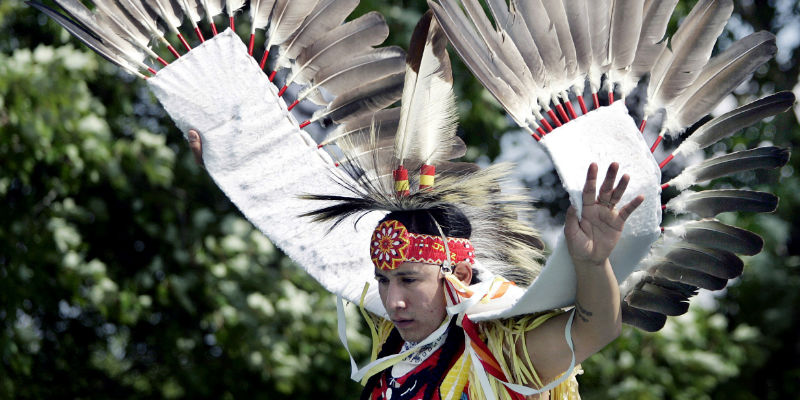Gov’t to allow Indians to possess eagle feathers

In this May 27, 2006 file photo, Joseph Bearstail. a member of the Sioux tribe from Preston, Conn., wears a costume with eagle feathers while performing a traditional dance during the American Indian Arts Festival at the Rankokus Indian Reservation in Westampton, N.J. The Justice Department on Friday, Oct. 12, 2012 said it is going to allow members of federally recognized Indian tribes to possess eagle feathers, although that’s a federal crime. AP Photo/Mel Evans, File
WASHINGTON — The Justice Department said Friday it is going to allow members of federally recognized American-Indian tribes to possess eagle feathers, although that’s a federal crime.
This is a significant religious and cultural issue for many tribes, who were consulted in advance about the policy the department announced.
The Bald and Golden Eagle Protection Act and other federal wildlife laws criminalize the killing of eagles, which are listed as either endangered or threatened, and possession of feathers and bird parts, but the Constitution and federal laws also give tribes local sovereignty for self-government.
Under the new Justice Department policy, tribal members will not be prosecuted for wearing or carrying federally protected birds, bird feathers or parts. They also may pick up feathers found in the wild as long as they do not disturb federally protected birds or nests. Giving, lending or trading feathers or bird parts among tribe members, without any other compensation, also will be allowed.
While Justice did not previously have a written policy, the new directive is in line with long-standing practice by Justice prosecutors, U.S. attorneys and the Interior Department not to prosecute in such circumstances.
But the Justice Department will continue to prosecute tribe members and nonmembers alike for violating federal laws that prohibit killing eagles and other migratory birds or the buying or selling the feathers or other bird parts.
In addition, members of federally recognized tribes are covered by the new Justice Department policy regardless of whether they have a U.S. Fish and Wildlife Service permit, Attorney General Eric Holder said in a memo to U.S. attorney offices around the country.
Holder said the new policy was issued to address concerns of tribal members who were unsure of how they might be affected by federal wildlife law enforcement efforts, particularly whether a permit would be required. The Fish and Wildlife Service issues a very limited number of permits for Indians to kill eagles in the wild or obtain feathers and carcasses of accidentally killed eagles from a federal repository.
Doug Craven, the natural resources director for the Little Traverse Bay Bands of Odawa Indians in Michigan, said tribal members there frequently encounter feathers from around 25 bald eagle nesting sites on their reservation. But it wasn’t always clear to them whether they could keep the feathers for ceremonial use or if they’d have to send them off to a repository.
“They feel that’s been gifted to them and they have a responsibility for that feather,” said Craven, who was part of a group consulting with the Justice Department on the eagle feather policy. “This policy supports that.”
While tradition and customs vary widely among the more than 500 federally recognized tribes, a high reverence for eagles is fairly consistent.
Holder said the new Justice Department policy strikes the right balance between enforcing wildlife laws that protect eagles and respecting the cultural and religious practices of federally recognized Indian tribes.
“From time immemorial, many native Americans have viewed eagle feathers and other bird parts as sacred elements of their religious and cultural traditions,” said Assistant Attorney General Ignacia Moreno, head of the department’s environment and natural resources division. She called the new policy “a major step forward by establishing a consistent and transparent policy to guide federal enforcement of the nation’s wildlife laws.”
Currently, a federal depository near Denver holds the carcasses of eagles that are killed by contact with power lines or other causes. Indians may apply for a feather or a carcass. There is a wait to get the feathers.
The Fish and Wildlife Service has issued a few permits allowing tribes to kill eagles in the wild. The Hopi Tribe has killed golden eagles under a federal permit for years. The Northern Arapaho Tribe of Wyoming received a federal permit from the Fish and Wildlife Service earlier this year that would allow the tribe to take up to two bald eagles a year for use in the tribe’s annual Sun Dance.
However, the Northern Arapaho are suing the Fish and Wildlife Service in federal court. The tribe argues the federal permit is meaningless because it would limit the tribe to killing bald eagles outside the Wind River Indian Reservation, but a Wyoming state law prohibits killing eagles outside the reservation.
___
Associated Press writers Ben Neary in Cheyenne, Wyoming, and Felicia Fonseca in Flagstaff, Arizona, contributed to this report.














